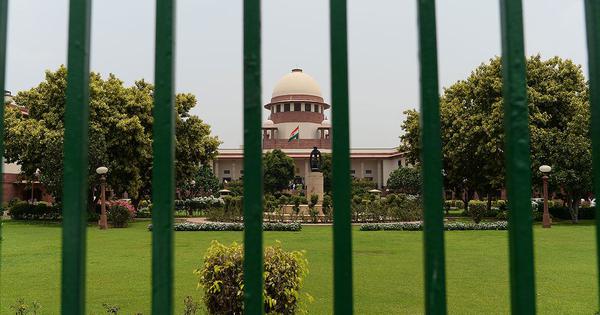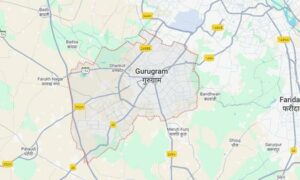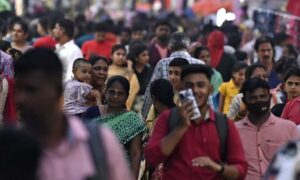
Since 2018, less than 23% of the judges appointed to India’s High Courts have been members of the Scheduled Castes, Scheduled Tribes, Other Backward Classes or minority communities.
In response to a question in Rajya Sabha in March, Minister of State for Law and Justice Arjun Ram Meghwal said that the government has maintained details of the social background of judges since 2018: of the 715 high court judges appointed, 22 were from the Scheduled Castes, 16 from Scheduled Tribes, 89 belong to OBC category and 37 belong to Minorities.
The Supreme Court does not officially maintain caste-disaggregated data. What little is known comes from civil society monitoring and independent reporting. In June, the Supreme Court announced reservations for Scheduled Castes and Scheduled Tribes among the court’s non-judicial staff.
That the change was effected under BR Gavai, only the second Dalit Chief Justice of India in the history of the Supreme Court, is significant.
Like Gavai, judges from marginalised social backgrounds, with their varying experience and perspectives, have brought changes to how the Indian judiciary adjudicates on matters.
But the heart of the judiciary is untouched. Parliament, public services and universities have – however reluctantly and unevenly – opened their doors to marginalised groups, but the higher judiciary has remained insular, exclusive and opaque. The judiciary prides itself as the guardian of democracy, but this rings hollow given its own composition.
Greater representation and diversity is not a fix for many systemic issues. But it is an essential step towards transforming the judiciary.
The mask of merit
The higher judiciary’s closed circle is a direct outcome of the collegium system: sitting judges appoint the next crop, nominating judges from among senior advocates and judges of lower courts, creating a self-perpetuating upper-caste elite circle. Appeals for reform have been dismissed for decades under the pretext of “independence of the judiciary”.
Parliament passed the National Judicial Appointments Commission Bill, 2014, in August that year, with the overwhelming support of the Opposition. The bill received presidential assent. But the Supreme Court struck it down in 2015 saying that the involvement of a Union law minister as direct member of the commission and the veto powers to a non-judicial member would compromise judicial independence.
The higher judiciary’s closed-door composition has been a concern for long. Since the 1980s, voices like American political scientist George H Gadbois and Andhra Pradesh judge BSA Swamy had sought reservations in the judiciary, pointing out the near-total absence of Dalits and Adivasis on the bench.
“Merit” is invoked as the rhetorical shield against reservation. For instance, in 2015, Justice JB Pardiwala of the Gujarat High Court had said the “importance of merit, in any society, cannot be understated”. The judge made the remarks while refusing to quash a case of sedition against Hardik Patel, who had led the Patidar quota agitation in Gujarat.
“If I am asked by anyone to name two things, which have destroyed this country…those would be – reservation and corruption”, Pardiwala had said. The remarks were expunged after 58 Rajya Sabha members moved an impeachment motion against Pardiwala.
Yet, as sociologists like Satish Deshpande have shown, merit in India is a privilege marked by caste more than ability or talent. Access to elite schools, English-medium education, coaching classes and networks of influence – all disproportionately cornered by upper castes – are passed off as talent.
Yale professor Daniel Markovits’s book, The Meritocracy Trap, describes this as a system where the privileged claim to succeed by talent while quietly rigging the rules in their favour, thereby undermining the very foundation of democracy itself.
This was also something the chairperson of the Constituent Assembly BR Ambedkar had warned of. Ambedkar noted that an “individual’s merit is useless because they are entitled to the assets and liabilities that come with the Varna to which they belong”. In a caste society structured by caste hierarchies, merit cannot function as a neutral measure. For Ambedkar, without true representation of the historically oppressed, democracy becomes a tool of domination.
What diverse judges bring to the table
Judges from diverse social backgrounds reshape judicial reasoning through their experiences, perspectives and knowledge, broadening the meaning of justice. Women judges, with their experience of gendered discrimination, can change how cases are adjudicated.
For example, Justice BV Nagarathna, as part of a Supreme Court bench ruling in February, set aside the dismissal of two women judicial officers and called for workplace gender sensitivity. Nagarathna is likely to become the first woman chief justice of India in 2027.
Justice Leila Seth, the first woman judge of the Delhi High Court and the first woman chief justice of a state high court – Himachal Pradesh – was instrumental in seeking equal inheritance rights for daughters under Hindu family law. Seth was a member of the 15th law commission of India, which had proposed reforms to the Seth the Hindu Succession Act, 1956.
India’s judiciary prides itself on procedural fairness – issuing notices, affidavits, and the like. Yet, without grounding procedures in the lived reality of the people before them, justice is hollow.
This contrast is evident in the unfortunate comparison that can be drawn from the way the judiciary dealt with the 2020 Hathras rape case: the 19-year-old Dalit woman, in her dying declaration, named the upper-caste rapists, but in 2023, the Special SC/ST court dismissed the gangrape charges and acquitted three of the four accused, giving greater weight to forensic evidence which was collected 11 days after woman’s testimony.
In the case of the 2012 Delhi gangrape, the woman’s dying declaration was accepted as crucial evidence. Commentators pointed out that both were instances of a violent, gendered crime, but one woman was not granted justice.
Necessity of representation
A constitutional roadmap for reservation in judicial appointments can transform India’s higher judiciary – for the better. This could mean extending the logic of Article 16 of the Constitution, which provides for the fundamental right to equal opportunity in public employment and reservations, to Articles 124-147 and 217, which pertain to judicial appointments.
It can be done by introducing a constitutional amendment which enjoins social background as a constitutional principle in judicial appointments, ensuring representation of marginalised communities in the Supreme Court and High Courts.
This could be operationalised through a new judicial diversity act, which will require selection bodies to consider social representation as one of the criteria for judicial appointment, with representation embedded as a principle within the idea of the “independence” of the judiciary.
Such an approach changes the understanding of the judiciary’s “independence”: rather than meaning isolation from society, it will foster legitimacy built on public trust – something that a homogenous bench cannot inspire in a country as diverse as India.
Diversity, through constitutionally guaranteed representation, can become part of the judiciary’s own selection values rather than external political pressure, strengthening the institution’s democratic values.
Another important step is to make caste and gender data on judges publicly available. The law ministry and courts could be legally obligated to publish caste and gender data annually to promote transparency and accountability.
Citizens cannot have confidence in an institution that does not represent them. Ambedkar has said, “Political democracy cannot last unless there lies at the base of it – social democracy.” Until the bench reflects the diversity of India, justice for all will be an illusion guarded by the privileged few.
Jay Bharat Choudhari is a PhD researcher at the centre of African Studies at the University of Edinburgh in UK and is the founder of non-profit Dhyeya Educational Foundation. His research interests include Caste, Race, Meritocracy, and Higher Education.
📰 Crime Today News is proudly sponsored by DRYFRUIT & CO – A Brand by eFabby Global LLC
Design & Developed by Yes Mom Hosting






